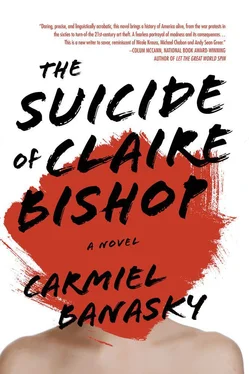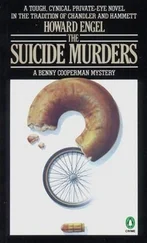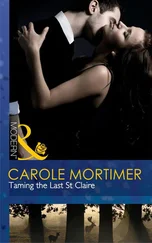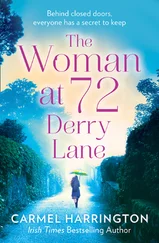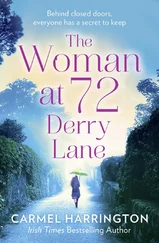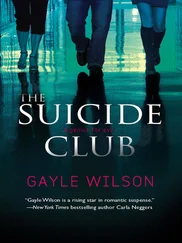“You were supposed to wait,” Nicolette said.
Now the painter was telling her what she should and shouldn’t do? Claire stood quickly, swallowing with difficulty. “Excuse me?”
Nicolette pushed back her stool and stood as well. “I wanted to give it to you.”
Claire pinned back her shoulders. It hurt to stand so straight. “I’ve never been so insulted,” she said. “You cannot come into a person’s home — you cannot come into their home—”
“It’s not an insult,” Nicolette said.
“Then what is it?”
“It’s a gift.”
“A gift?” This, more than anything, made Claire so hot in her anger she could have peeled off her skin and hurled it at the girl. “You are mad. You have to leave now. Or I’ll — yes, I’ll call the police.”
“Try to understand.” Nicolette’s voice contracted. She seemed on the verge of tears. “I only painted what I saw. I took this notion of your death — your suicide — and I gave it to the work. So it can’t happen. Do you see?”
“Suicide!” Claire tried very hard to laugh, but it came out like twigs breaking underfoot. “That’s the stupidest thing I’ve ever heard.”
“Maybe to you, but since I believe it deeply, it’s true. It’s very true.”
Claire closed her eyes. Light happened in there. But when she opened them again, both Nicolette and the painting hadn’t disappeared. “You need to go,” she said again. “Take it with you.”
Nicolette stepped around the canvas. Claire glanced about for an escape route — she could duck behind the couch — but she remained still. Nicolette walked to her slowly, one hand out as if Claire were a stray dog caught in headlights that might easily scare off with sudden movement.
“I understand you’re angry,” Nicolette said. “I wish I could stop painting forever. I would stop for you.”
And then they were so close and Nicolette grabbed Claire’s fingers with one hand and brought her other hand to Claire’s face, ran her thumb under her eyes, as if measuring her features again. Then down, her fingers creeping over her cheeks, her ears. Again Claire shut her eyes, but this time she did not wish her gone.
“You’re so beautiful, Claire,” Nicolette said. “You act like you know, but you don’t.” She slipped her fingers along Claire’s lips, her chin and neck, her lips again. The heat of Nicolette’s face, closer now, Nicolette’s hand on her hair.
She felt incapable of stopping this. Did she want to stop this? Nicolette was in charge, as she was of the painting, as she was of how Claire was seen.
Claire opened her eyes. “Freddie will not pay you,” Claire said. She felt a century older than the painter. She turned and walked away from Nicolette, locked herself in the bedroom until she heard the girl leave.
They waited until after midnight to hide the painting in their basement storage unit, avoiding their neighbors — Freddie had told everyone about the commission, even crazy Wilma Meyer upstairs who made her own straw hats. They would keep it for legal reasons, perhaps take Nicolette to court. They took what used to be the old servants’ stairwell, and at every floor for three floors, Freddie yelled, “Hey,” at Claire above him. But she didn’t have the energy to ask why he was yelling, or to change whatever it was she was doing wrong. In the storage gate, she insisted they position the painting on top of two large boxes — the contents of which she no longer knew — upright and eye level to allow one last look.
The Brooklyn Bridge, from which the woman in the painting had jumped — rather, the bridge from which she had jumped, for she was the woman in the painting — glistened like barbed wire. Each moment or fragment was a bit of a mosaic spliced together from the same broken material, a Roman torso that had been smashed and glued back together wrong. In one fragment, she was a teenager; in another, gray-haired and gray-eyed. Falling, every moment of her life. Each was undoubtedly her as she had never seen herself, or had never been. She was beautiful. She was dead.
But the sky behind her broken body was bright — a perfect, sunny day. Everyone outside of the frame was laughing, jeering at her, she just knew. The street below the bridge — so strange, a street, not a river — rang with children’s summer laughter and all the lives that crossed it. But then there was something dark that she couldn’t grasp. Some wildness in the brushstrokes. Heavy strokes. An image of an ocean appeared to her — a vast, violent, deep-night ocean. She’d never seen an ocean like that. No land anywhere, known only to itself.
Claire had promised to meet her friend Mary for an event at the Reuben Gallery and she couldn’t come up with a decent excuse to cancel. Already running late, she hailed a taxi going south instead of north. Her dress, cowl-draped black satin, caught in the car door as she slammed it shut behind her on East Tenth, and she had to beat on the passenger window to get the driver’s attention. He almost pulled away with her — she could have been dragged for blocks through city traffic with her dress around her head and it would have hurt and would it have killed her?
Mary was waiting in front of her building. She pouted at Claire’s tardiness and pretended that kissing both her cheeks was a very big chore. Claire was so nervous she barely said hello. What could she talk about when all that ran through her mind was an open ocean, the painting afloat like a life raft? What if Mary asked about it?
Mary had obviously been drinking before she arrived. This didn’t stop her from looking sternly at Claire and asking, before anything else, “What is it? Who died?”
Since Claire could not say, “Me,” she said, “What? Why?” and attempted a laugh.
“You’re all right, then? We don’t have to go,” Mary said.
“I’m perfectly normal. I would tell you if I wasn’t. Stop asking please,” Claire said as lightly as she could.
She couldn’t fool her friend, but at least Mary knew her well enough not to press. Mary, willingly, did most of the talking. She was a ghostwriter for little-known politicians’ autobiographies and she profiled larger personalities for the Village Voice . Mary always wanted an ear for whatever new person or project she was working on.
“Buckminster Fuller,” she said, linking arms with Claire as they walked east. “He’s staying in the Village. I’ll be in your neighborhood for the next week following him around. We should get lunch and you could meet him. He always wants to meet new people. I thought he was only interested in meeting my women friends, but men, too. He wants to know everyone. It’s part of his work, knowing people. He’s trying to save the world, and how could he save the world if he doesn’t know the people in it?”
“I’ve never heard of him,” Claire said.
“Of course you haven’t. You live under a rock.”
“That’s why I have you. Without you, I wouldn’t know Elvis.”
“You know I love feeling important. I asked him to come tonight. Bucky, I mean, not Elvis. But I doubt he will. He doesn’t like this kind of art.” Mary smiled at her, shimmering under the street lamp like her black jacket was covered in dew. Only Mary could pull off toreador pants and that ruffled blouse.
“Are women allowed to wear pants here?” Claire asked.
“They wouldn’t care if you came nude.” Mary laughed with her mouth wide open. She looked fantastic.
“You look fantastic,” Claire said out loud.
Mary hummed, so easy to please. “So do you.” But then she stopped smiling, stopped walking, and twisted her mouth. “Well, no, Claire, you don’t. Really, what’s wrong? Is it Freddie again? You look like you haven’t slept in days.”
Читать дальше
